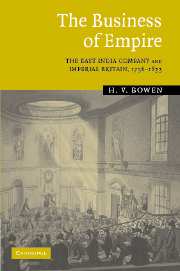Book contents
- Frontmatter
- Contents
- List of figures
- List of tables
- Preface
- Notes on the text
- List of abbreviations and short titles
- 1 Introduction
- 2 Relationships: city, state, and empire
- 3 Relationships: government and the Company
- 4 People: investors in empire
- 5 People: Company men
- 6 Methods: an empire in writing
- 7 Methods: the government of empire
- 8 Methods: the management of trade
- 9 Influences: the Company and the British economy
- Afterword
- Index
9 - Influences: the Company and the British economy
Published online by Cambridge University Press: 09 July 2009
- Frontmatter
- Contents
- List of figures
- List of tables
- Preface
- Notes on the text
- List of abbreviations and short titles
- 1 Introduction
- 2 Relationships: city, state, and empire
- 3 Relationships: government and the Company
- 4 People: investors in empire
- 5 People: Company men
- 6 Methods: an empire in writing
- 7 Methods: the government of empire
- 8 Methods: the management of trade
- 9 Influences: the Company and the British economy
- Afterword
- Index
Summary
This study has concentrated primarily upon the internal changes that occurred to the East India Company in Britain as a result of the transition from trade to empire in Asia, and examinations have been undertaken of what happened inside East India House. But, as was established in the last chapter, the Company's relationships with domestic merchants and manufacturers ensured that it always had links with the wider British economy, and this raises the question of how the late eighteenth-century expansion of trade and empire affected the Company's interactions with the world beyond Leadenhall Street. Certainly, many of those who were sympathetic towards the Company believed that the material benefits of expansion were widely felt in Britain, and they were able to argue that financial rewards filtered through to many different sections of society. This was made clear in 1813 by Thomas Plummer who argued ‘without pressing this calculation to an extreme’ that a ‘large portion of the community are directly or indirectly interested, by themselves or their connections, in the prosperity of the East India Company, especially in the metropolis’. He identified nine groups of people who drew benefit from the Company, ranging from the stockholders through to those who were dealers in India and China goods, and he concluded that ‘When all these classes of people are taken into consideration, and we reflect for a moment how widely their connections are diffused, it may surely be said, with fairness, that scarcely any part of the British community is distinct from some personal or collateral interest in the welfare of the East India Company.
- Type
- Chapter
- Information
- The Business of EmpireThe East India Company and Imperial Britain, 1756–1833, pp. 260 - 295Publisher: Cambridge University PressPrint publication year: 2005

